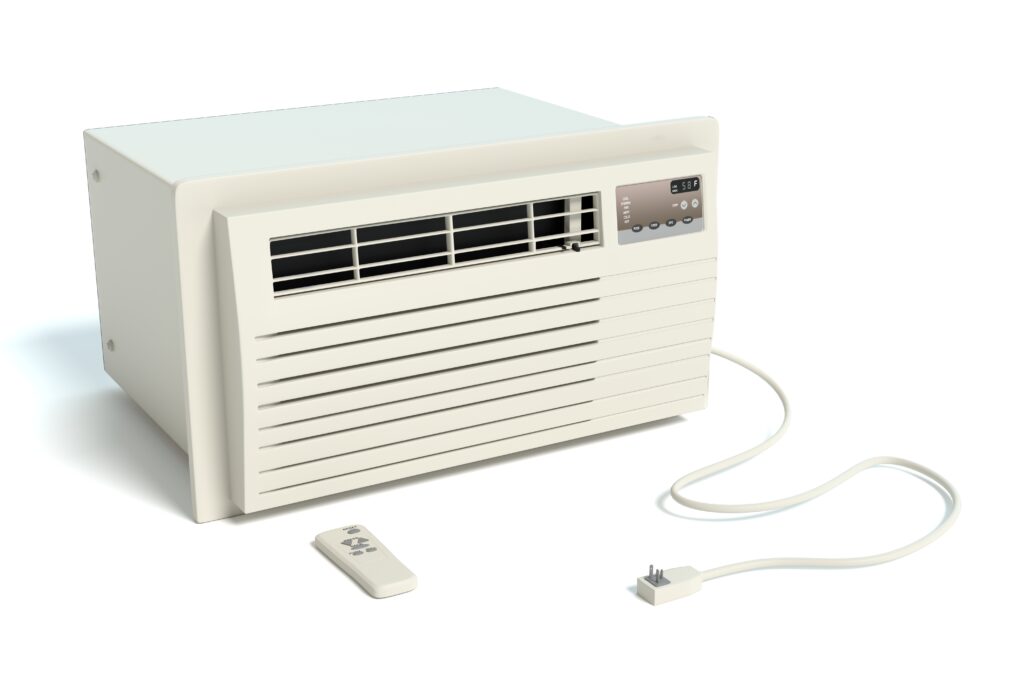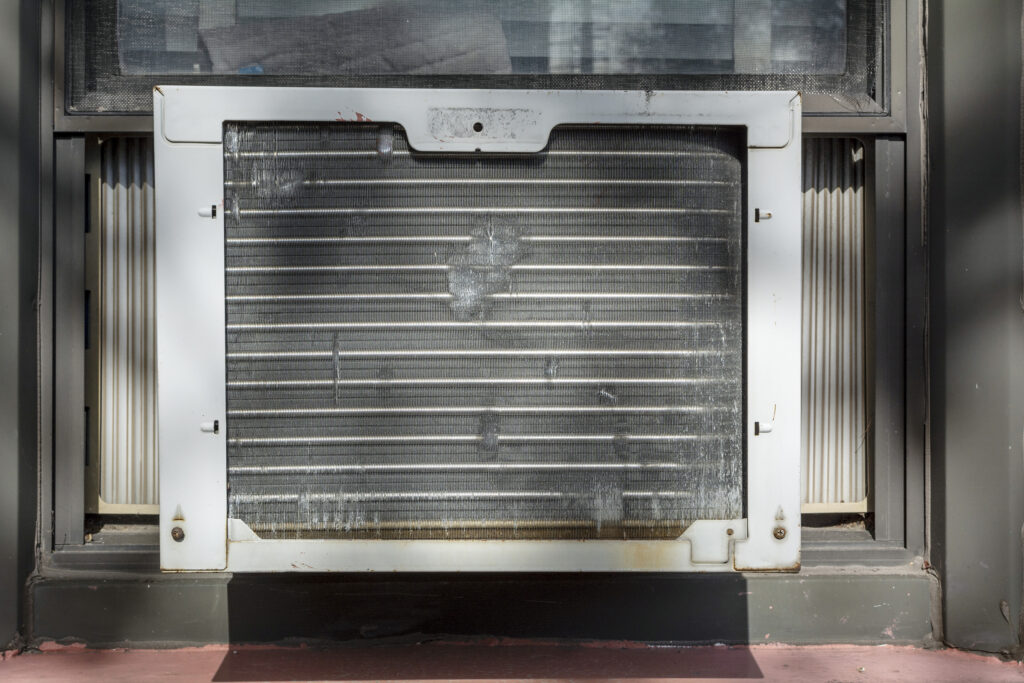Introduction
Window air conditioners are one of the most affordable AC options on the market. If you are looking for a small AC unit that can cool a single room, a window air conditioner might be the best option for you. Window air conditioners, however, present unique challenges. In our blog post, “Window Air Conditioners vs. Central Air Conditioners,” we talk about the cooling capabilities of window and central air conditioners, whether they are permanent or not, and how much they cost. While that is all helpful information, it doesn’t cover everything about window air conditioners. In this blog post, we will talk about what a window air conditioner is, the pros and cons of owning one, and common problems with them. If you have any questions after reading this blog post, leave a comment below.
What Is a Window Air Conditioner?
A window air conditioner is a small AC unit that fits into an open window. They are designed to cool small spaces, such as a room. Window air conditioners pull hot air in, cool it, and then blow cold air out. To keep water from building up and flooding a room, a window air conditioner uses a drain to get rid of any excess water. The drain rests outside the window and tends to be a plastic tube. When this drain is fully functioning, the window air conditioner should not have any leaks. The rest of the window air conditioner is contained inside the unit.

What Are the Pros?
There are many pros to owning window air conditioners. They are great for small spaces, inexpensive, low maintenance, and easy to install.
- Great for Small Spaces
As mentioned above, window air conditioners are made to cool small spaces efficiently and effectively. They are not permanent, however, and you can remove them whenever you desire. Window air conditioners can also be used along with central air conditioners. The amount of square footage a window air conditioner can cool is determined by its BTUs. BTUs, British thermal units, are a unit of measurement that tells you how much energy your air conditioner has to use to cool a space. The more square footage you need to cool, the higher your window air conditioner’s BTU level needs to be.
- Inexpensive
In most cases, window air conditioners are less expensive to install and power than central air conditioners. Window air conditioners are powered by electricity, so all you need to do to power them is plug them into an electrical outlet. They also use less electricity on average than central air conditioners do. According to Forbes, a window AC uses 500 to 1,440 watts of electricity on average, while a central AC uses up to 3,500 watts of electricity. This means that window air conditioners are, by far, more cost-efficient than central ACs unless you need to cool multiple rooms. If you do, then central ACs are more affordable in the long run.
- Low Maintenance
Window air conditioners are low maintenance. There are only a few things you need to do to maintain your window air conditioner. First, always change your filter. If you ever have any issues with your window air conditioner, the first thing you should do is check your filter. If it is clogged then your window air conditioner will not be able to work as efficiently or at all. It can also cause a multitude of problems and is usually the first thing HVAC technicians will check if you are having an air conditioner problem.
You should also make sure that debris doesn’t gather on the unit. If debris gathers on the unit, it can restrict the window air conditioner’s airflow. Dirt and debris can also cause your window AC to overheat. If your window AC overheats enough, then it will catch on fire.
Two other things you should do to maintain your window air conditioner are clean the fins–the grill-like pieces of metal or plastic that are in the front of your window AC–and the drain pan. The drain pan in a window AC is a small pan on the bottom of your window AC that collects any moisture from your unit’s components. You should empty and clean it out occasionally to make sure it doesn’t back up your unit. Your drain pan is connected to your drain hole too, so taking it out and cleaning it allows you to check that your window AC’s drain hole isn’t clogged. If it is, clean it of debris. While this may seem like a lot of maintenance, all of it can be done by someone with little to no HVAC skills to help them save money in the long run.

What Are the Cons?
While window air conditioners have several pros, they have their fair share of cons too. Window air conditioners present security risks, can be viewed as aesthetically displeasing, and fewer HVAC companies are willing to work on them.
- Security Risk
Window air conditioners are a huge security risk. In order for a window AC to work, the window where the window AC is located must be open at all times. If it is not secured, it can be pushed in easily. Criminals often target buildings with unsecured window ACs because they offer an easy way to get in. Window ACs present even more of a security risk if they are installed at ground level.
If they are installed on higher levels, then they might be dangerous for other reasons. While it is rare, improperly installed Window ACs can fall. If they fall, they may injure people passing by. Your window AC unit will also be damaged if it falls. The higher it is, the more devastating the fall could be. You should remove your window unit if you plan on leaving your home for a long period of time.
- Aesthetically Displeasing
Window air conditioners may seem aesthetically displeasing to some people. They are, after all, bulky units that take up what can be a significant amount of space. They block windows and limit options. People cannot put anything in front or near a window AC because it might block airflow. That is incredibly inconvenient. Window ACs also stick out like a sore thumb. There are window ACs that are made specifically to be discrete and blend into a room’s surroundings better, but they cost more because of it. All in all, if aesthetics are important to you, you may have to spend more money on a window air conditioner that fits your cooling and aesthetic needs.
- Fewer HVAC Companies Are Willing to Work on Them
Fewer HVAC companies are willing to work on window air conditioners due to a variety of reasons. The main one, however, is that it simply isn’t cost-efficient to work on them. With window air conditioners being so inexpensive, calling out an HVAC technician to determine what is wrong with them, having the HVAC technician order and install a part if needed, and making sure that it works simply isn’t cost-effective. According to Home Advisor, the average amount it costs to repair a window AC, including labor, is $243. To put that into perspective, window air conditioners can be bought for as little as $150. You could end up spending more money trying to repair your window AC than you spent buying it in the first place.
If your window AC is a more expensive unit, however, then it may be worth calling an HVAC company to work on it. If it is not a more expensive unit and cannot be fixed with simple troubleshooting steps, such as changing the filter and making sure the unit is installed properly, then buying a new window AC may be the most cost-effective option.

Common Problems With Window Air Conditioners
Doing a few simple things can fix common issues with window air conditioners. If your window air conditioner is having trouble, it is always worth trying them. If you do, it may save you from having to call an HVAC company or having to replace your window air conditioner unit entirely. If none of these fixes work for common issues, it may be worth calling an HVAC company if it is cost-effective.
- Water Leaking
Water leaking out of a window air conditioner is, unfortunately, a common issue with window air conditioners. Luckily, there are some things you can do to try and fix it. First, you should confirm your window AC is installed properly. If it is lopsided or leaning in any way, it could be the reason why your air conditioner is leaking.
If that isn’t the issue, then check the drain pan. As mentioned in the “Low Maintenance” section, the drain pan is a small pan located at the bottom of your window AC that collects moisture. If it collects enough moisture, then it can overflow and cause leaking. You should unplug your window AC and check your drain pan. If needed, empty it or simply wipe it down. You should also check that the drain hole isn’t clogged. If it is clogged, gently remove the debris from it. After that, check to see if that fixes the leaking. If that doesn’t work, you should also try changing your filter. Your filter being dirty may have led to your window ac leaking.
If your window AC is still leaking after you have done all of the following troubleshooting steps, it may be because your window AC’s refrigerant levels are low. We do not recommend replacing it yourself, so you may have to call an HVAC company to do it for you, or it may be a sign that it’s time to replace your air conditioner.

- Air Conditioner Won’t Turn On
If your air conditioner won’t turn on, the solution may be simpler than you realize. While it may sound silly, checking to see if your air conditioner is plugged in is a valid troubleshooting step. Most HVAC technicians will first check to make sure that a window air conditioner is plugged in if it isn’t turning on. If it is plugged in, check that your window air conditioner’s outlet works. Test the outlet, and if it works, then check your window air conditioner’s wire. If it is damaged, that might be the reason your air conditioner won’t turn on.
- Air Conditioner Is Loud
If your window air conditioner is loud, then there are a few things to consider. Unfortunately, some window air conditioners are simply louder than others. You should research your unit to find out if other people have mentioned it being louder, then it may just be louder than other window air conditioner units.
If your window air conditioner is not known for being loud or was quieter before, then you can rule it out being a known unit issue. As is a common theme with window air conditioners, you should always make sure that it is installed correctly. If it is not installed correctly, then it will cause a multitude of issues. You should also check your filter. If you haven’t changed the filter in a while, it is recommended to do so.
Another thing you can do is check for debris in or around your AC unit. If there is any debris, it may be the reason your air conditioner is making noise. If that doesn’t work, look at the screws on your AC unit. If they seem to be loose, try tightening them and see if that helps. We hope those troubleshooting steps help solve your issue, and if they don’t, it may be time to call an HVAC technician.

Conclusion
We hope this blog post helped you learn the basics of window air conditioners along with their pros and cons, and how to troubleshoot them. They can be a great cost-effective way of cooling small spaces, and depending on your cooling needs, they might be perfect for you. Unfortunately, we do not service window air conditioners, but we do service central air conditioners! If you have a central air conditioner that needs servicing and live in St. Louis County or the surrounding areas, give us a call at 636-475-9384 or use the contact form! Not sure if we service where you are? You can check out where we service by clicking here. We look forward to hearing from you.